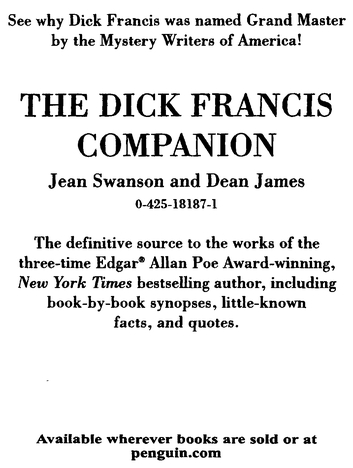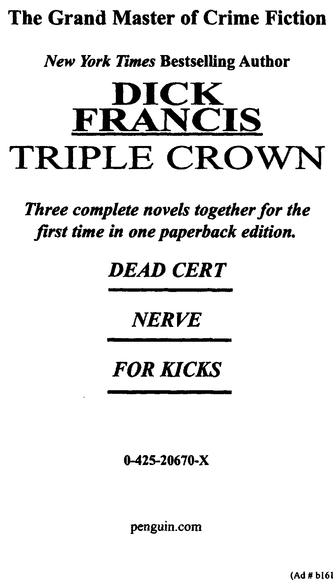Come to Grief (40 page)
Authors: Dick Francis

The only problem with the road, which served to remind me that an outside world existed, was that my dwelling was visible from it, so that far too often I found strangers on my doorstep, hikers equipped with shorts, maps, half-ton walking boots, and endless energy. There was nowhere left in the world unpene trated by inquisitive legs.
On the day of my mother’s postcard, I returned to find four of the species poking around without inhibitions. Male. Blue, scarlet, orange backpacks. Glasses. English regional voices.
The days when I’d offered tea, comforts, and conversation were long gone. Irritated by the invasion, I drove onto the plateau, stopped the engine, removed my keys from the ignition, and walked toward my front (and only) door.
The four men stopped peering into things and arranged themselves into a ragged line ahead of me across my path.
“There’s no one in,” one of them called. “It’s all locked up.”
I replied without heat, “What do you want?”
“Him as lives here,” one said loudly.
“Maybe that’s you,” said another.
I felt the first tremble of something wrong. Their manner wasn’t the awkwardness of trespassers caught in the act. There was no shuffling from foot to foot. They met my eyes not with placating apology, but with fierce concentration.
I stopped walking and said again, “What do you want?”
The first speaker said, “Where is it?”
I felt a strong primitive impulse to turn tail and run, and wished afterward that I’d listened to the wisdom of prehistory, but somehow one doesn’t easily equate knobbly-kneed hikers with danger.
I said, “I don’t know what you mean,” and I made the mistake of turning my back on them and retracing my steps toward the jeep.
I heard their heavy feet scrunching on the stony ground behind me but still didn’t truly believe in disaster until they clutched and spun me around and purposefully and knowledgeably punched. I had a sort of splintered composite view of intent malevolent faces, of gray daylight reflecting on their incongruous glasses, of their hard, bombarding fists and of a wildly slanting horizon of unhelpful mountains as I doubled forward over a debilitating pain in the abdomen. Neck chop. Jabs to the ribs. Classic pattern. Over and over. Thud, merciless thud.
I was wearing jeans, shirt, and sweater: they might as well have been gossamer for all the protection they offered. As for meaningful retaliation, read nonexistent. I couldn’t find breath. I swung at them in anger but fought an octopus. Bad news.
One of the men kept saying insistently, “Where is it? Where is it?” but his colleagues made it impossible for me to answer.
I wondered vaguely if by “it” they meant money, of which I carried little. They were welcome to it, I thought groggily, if they would stop their actions. I unintentionally dropped my small bunch of keys and lost it to a hand that grabbed it up with triumph.
Somehow or other I ended with my back against the jeep: no further retreat. One of them snatched handfuls of my hair and banged my head against metal. I clawed blood down his cheek and got a head-butt in return that went straight from my skull to my knees, buckling them like butter.
Events became unclear. I slid to the ground, face-down. I had a close view of gray, granite stones and short, dry, struggling blades of grass, more brown than green.
“Where is it?”
I didn’t answer. Didn’t move. Shut my eyes. Drifted. “He’s out,” a voice said. “Fat lot of help you are.”
I felt hands roughly searching my pockets. Resistance, as an option, promised only more bruises. I lay still, not wholly conscious, inertia pervading, angry but willy-nilly passive, nothing coordinating, no strength, no will.
After a time of floating, I felt their hands on me again.
“Is he alive?” “No thanks to you, but yes, he is. He’s breathing.” “Just leave him.” “Chuck him over there.”
“Over there” turned out to be the edge of the plateau, but I didn’t realize it until I’d been dragged across the stones and lifted and flung over. I went rolling fast and inexorably down the steep mountain slope, almost bouncing from rock to rock, still incapable of helping myself, unable to stop, dimly aware of flooding with whirling, comprehensive pain.
I slammed down onto a larger rock and did stop there, half on my side, half on my stomach. I felt no gratitude. I felt pulverized. Winded. Dazed. Thought vanished.
Some sort of consciousness soon came crazily back, but orderly memory took much longer.
Those bastard hikers, I thought eventually. I remembered their faces. I could draw them. They were demons in a dream.
The accurate knowledge of who I was and where I was arrived quietly.
I tried to move. A mistake.
Time would take care of it, perhaps. Give it time.
Those bastards had been real, I realized, demons or not. Their fists had been real. “Where is it?” had been real. In spite of everything, I ruefully smiled. I thought it possible that they hadn’t known what they were actually looking for. “It” could have been whatever their victim valued most. There was no guarantee in any case that delivering up “it” would save one from being thrown down a mountain.
It occurred to me to wonder what time it was. I looked at my left wrist, but my watch had gone.
It had been about eleven o‘clock when I’d got back from the post office ...
Hell’s teeth
, I thought abruptly.
Mother. Ivan. Heart attack
. I was supposed to be going to London. Or the moon.
, I thought abruptly.
Mother. Ivan. Heart attack
. I was supposed to be going to London. Or the moon.
The worst thing I might feel, I considered, was nothing.
Not the case.
With fierce concentration, I could move all my fingers and all my toes. Anything more hurt too much for enthusiasm. Outraged muscles went into breath-stopping spasms to protect themselves.
Wait. Lie still. I felt cold.
Bloody stupid, being mugged on one’s own doorstep. Embarrassing. A helpless little old lady I was not, but a pushover—literally—just the same.
I found the casual callousness of the walkers extraordinary. They had appeared not to care whether I lived or died and had in fact left it to chance. I supposed they could truthfully say, “He was alive when we saw him lasl” They could dodge the word murder.
The ebb tide in my body finally turned. Movement could at last be achieved without spasm. All I had to do from then on was scrape myself off the mountain and go catch a train. Even the thought was exhausting.




Other books
The Other Half of Life by Kim Ablon Whitney
Frosted Midnight: A Christmas Novella by Wilde, Breena, !2 NAs of Christmas
Love Beyond Belief (Book 7 of Morna’s Legacy Series) by Bethany Claire
The Splintered Eye (The War of Memory Cycle) by H. Anthe Davis
Lockdown by Walter Dean Myers
Embers & Echoes by Karsten Knight
Rottenhouse by Ian Dyer
Peterhead by Robert Jeffrey
Lark and Wren by Mercedes Lackey
